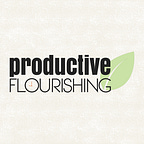Topics We Explored:
In this episode, Angela joins Charlie to talk about tipping points in your career or business that require you to change something. These tipping points could be changing in family arrangements, burn out, or a number of different things. They look at these periods of time when you’re going through something and you can’t do “business as usual,” how to recognize those times, and what to do to deal with them.
Links and Resources Mentioned in This Episode:
Falling Upward, by Richard Rohr
Thanks for Listening!
Subscribe to Productive Flourishing on Apple Podcasts to get all the latest episodes delivered straight to your preferred mobile device. This is the perfect option for listening to the show in the car, on the subway, or while you’re working out. Plus, you won’t have to fuss with figuring out how you’re going to listen.
Episode Timestamps
[3:50] - With summertime rolling in, for people who may be more naturally energetic in the earlier parts of the year, the changing of the season can create different tensions as you start to slow down. While it’s important to listen to these signals, they may not always coincide with your business demands.
[6:27] - Whether you’re burnt out, “well done,” or you see it coming, these are all things to be paying attention to. This may also be a good time to invite some reflection into your life.
[8:27] - While these situations may look different for different people, they are all situations where we need to be internally more aware. No matter what your work situation is, it’s important to be able to tune in to where your energy is at and what is going on in your personal and work life.
[11:00] - Many of our creative listeners are constantly pushing and driving. One of the life lessons to learn is to moderate the driving, or lean into the driving in certain ways. It can be easy to localize what we’re going through, but there seems to always be something else that needs to be done. Zoom out - don’t look at just what you have to do this week or this month. Look for patterns to make sure you’re not overworking yourself.
[17:32] - One thing that happens for Charlie when he gets in these situations is that it takes him a lot of effort to engage with projects he usually enjoys (and also that need to get done). For example, writing is usually cathartic, but that’s one of the things he has trouble with when he’s getting close to well-done. When he notices this, he is able to ease up slowly to avoid reaching the burn out stage.
[23:17] - For Angela, there are a few things that start to happen. She can usually tell when she’s getting closer to burn out by the fact that her mood is more easily upset, and she tends to focus on things that aren’t very helpful.
[26:55] - Both Charlie and Angela pay attention to their behaviors as an indicator of their emotional state. All of us have different ways in which the toll of stressors show up for us. You may have to ask yourself “what am I doing that’s uncharacteristic of me?” or “what’s different and what could be causing it?”
[30:35] - Some reasons for these feelings creeping up could be changes in your external world, rather than you, or your work. Any of these things can increase emotional and cognitive pressure. Sometimes it’s hard to acknowledge how they’re affecting us.
[33:28] - Business and life are always connected. We have to acknowledge when work bleeds into our lives outside work.
[35:02] - What do we do when we notice ourselves in these situations? Charlie advocates for self-compassion - when you notice you’re going through something, the first response should not be to just soldier on. Before you jump right into fixing, acknowledge that something’s going on and take it seriously.
[37:08] - Whenever you know that something major is happening in your world, stop and think about how it affects you and what you had planned to do. Think about how it may requiring you to shift around the things you need to do.
[38:33] - Finally, try not to make a really drastic change, because this seems to make things considerably worse. Go through the process of who might be able to help you lighten your load or share responsibilities. If the load becomes too heavy to bear for you, find people and other sources to help distribute that load.
[42:36] - As he wraps this episode up, Charlie encourages you to think about where you are as far as the total load that you carry in your life, and seeing where you are on the spectrum on the way to well-done. Be compassionate with yourself about what you discover. No matter where you are, be thinking about what personal resources or practices you have that you can go to if you are getting too close to burnt-out. Building this team before you need it can help you avoid crashing and burning.
[46:22] - There are many people out there dealing with a similar feeling or situation, and Angela hopes that you will take some time to reflect on anything that has resonated with you in this episode, and pay attention to that.















